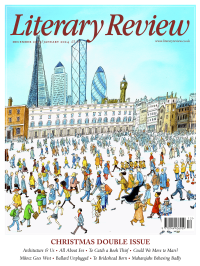Mark Glancy
Two Weddings & a Papal Bull
Erotic Vagrancy: Everything About Richard Burton and Elizabeth Taylor
By Roger Lewis
riverrun 765pp £30
Biographies of film stars generally fall into three categories: hagiographies written for the most admiring fans, exposés fuelled by gossip and scandal, and scholarly tomes centred on archival research or cultural theory. Roger Lewis makes it clear that his lengthy book about Richard Burton and Elizabeth Taylor belongs to none of these categories. Indeed, he seems sceptical about the very concept of biography, referring to it as an ‘illusion’ arising from the mistaken ideas ‘that real people are not perishable’ and that authors can ‘restore’ them. He prefers a form of ‘bricolage’, as he puts it, in which the story of these two stars’ lives and their tumultuous relationship is explored through film plots, the real-life events that parallel them, publicity stories and the observations of co-stars and relatives. He lays story upon story upon story to explore ‘everything’ about his subjects, as the book’s subtitle promises. This is a surprisingly postmodern approach for an author who begins his book with a fogeyish salvo against ‘feminist tracts by lady academics’ and uses such terms as ‘nelly’ and ‘swishy’ when discussing gay men. It is not a surprise to learn that his odd title – what on earth is ‘erotic vagrancy’? – derives from a papal denunciation of Taylor and Burton’s adulterous relationship. The perspective here is one of shock and awe at their outrageous transgressions.
The lives of Taylor and Burton – not to mention the many films they made separately and together – offer a great deal of story material. On the face of it, they were a mismatched pair. She was a cosseted child star during Hollywood’s studio era, under contract at MGM

Sign Up to our newsletter
Receive free articles, highlights from the archive, news, details of prizes, and much more.@Lit_Review
Follow Literary Review on Twitter
Twitter Feed
How to ruin a film - a short guide by @TWHodgkinson:
Thomas W Hodgkinson - There Was No Sorcerer
Thomas W Hodgkinson: There Was No Sorcerer - Box Office Poison: Hollywood’s Story in a Century of Flops by Tim Robey
literaryreview.co.uk
How to ruin a film - a short guide by @TWHodgkinson:
Thomas W Hodgkinson - There Was No Sorcerer
Thomas W Hodgkinson: There Was No Sorcerer - Box Office Poison: Hollywood’s Story in a Century of Flops by Tim Robey
literaryreview.co.uk
Give the gift that lasts all year with a subscription to Literary Review. Save up to 35% on the cover price when you visit us at https://literaryreview.co.uk/subscribe and enter the code 'XMAS24'